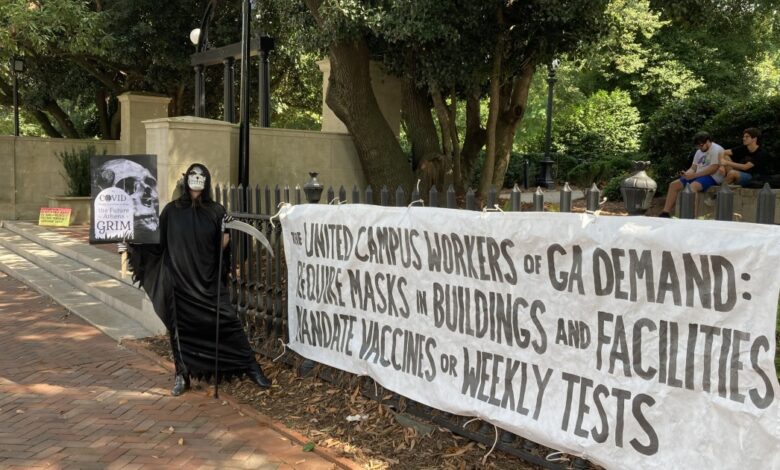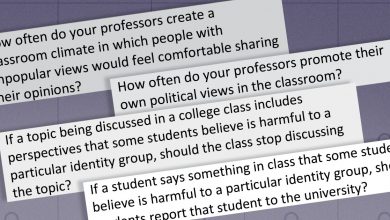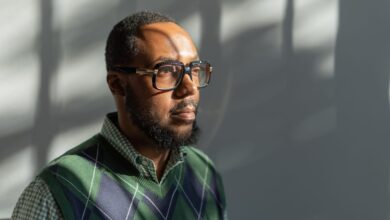Distressed by Light Covid Precautions, Georgia Faculty Members Take Action

[ad_1]
Joseph H.G. Fu knew he was breaking the rules.
In August, the University of Georgia mathematics professor told students that they must wear a mask to attend lectures or office hours, and that he reserved the right to cancel all in-person interactions and conduct them over Zoom.
Some professors feel stripped of their ability to determine what’s best for their students and themselves.
That runs afoul of University System of Georgia policy. Instructors at the system’s 26 public colleges aren’t allowed to require masks or unilaterally change their course modality. The system also distributed a template to provosts for disciplining faculty members who move a class online without prior approval, or who miss a lecture without either prior approval or a “documentable illness.” The steps range from a verbal warning to suspension or a reduction in duties and pay, depending on the conduct. Consideration for dismissal “will commence according to USG and university policy,” the guidance says. (Lance Wallace, the system’s associate vice chancellor for communications, said in an email the disciplinary framework is intended to help institutions “fashion their own policy or procedure” and does not carry the authority of a policy.)
Teresa MacCartney, acting system chancellor, defended the system’s Covid plans at a recent Board of Regents meeting. She said that students and state leaders expect safe, in-person learning, the Atlanta Journal–Constitution reported. “We continue to be in alignment with the governor’s expectations,” she noted. Gov. Brian P. Kemp, a Republican, has opposed both mask and vaccine mandates.
Yet Fu, like many faculty members across the state, doesn’t see the logic of those decisions. Fueled by the Delta variant, Covid hospitalizations across Georgia reached and then surpassed the levels of the winter peak. Meanwhile, vaccination rates lag. Faculty members are teaching to full classrooms in which they can only cajole students — some of whom are unvaccinated, as the system encourages vaccination but does not require it — to mask up. Some feel like their ability to determine what’s best for their students, and themselves, has been stripped. “Morale,” said Cindy Hahamovitch, Faculty Senate president at Athens, “is in the ditch.”
Last year, in the face of strong pressure from employees and students, the Georgia system backed down and required masks on its campuses. But so far this year, the system has not wavered on its plans. Starting Monday, faculty groups at 17 institutions are participating in a weeklong protest, led by the Georgia Conference of the American Association of University Professors and supported by United Campus Workers of Georgia, the systemwide employee union. A few professors like Fu have chosen to transgress in their classrooms, to send a message.
“I acknowledge that this unilateral action will be largely symbolic,” Fu wrote in a letter to his dean. “But surely in a university setting we can all understand that symbolism can have practical consequences.”
The many faculty members who did return have experienced a mixed bag. Some who walk into their classrooms are thrilled to be there, and their students cooperate with their requests to mask up, Hahamovitch said. Other instructors aren’t as lucky. Those professors are very worried about teaching in-person, especially those with young children at home who aren’t eligible to be vaccinated, she said. One faculty member at Dalton State College posted on Twitter that he starts every class by showing students an ultrasound photo of his son, due in October. He pleads with them to wear masks “as a personal favor” to his family.
I’m hearing terror, pretty much every day, all day.
“In small, at-capacity classrooms, only 5 of 45 of my students wore a mask,” the faculty member, Matthew LeHew, wrote. “I’ll never be able to look at this job the same way.”
In general, “I’m hearing terror, pretty much every day, all day,” Hahamovitch said.
Jamie Mitchem, a geography/GIS professor at North Georgia, said his son, a middle-schooler, has already been exposed to Covid twice since the semester began. Mitchem drove two counties over to purchase an at-home test, which was negative, but his son still had symptoms. So he and his wife waited two days for an appointment then waited almost three hours at the urgent-care facility. Ultimately, his son tested negative but the overall stress, Mitchem said, is unsustainable. “I just don’t know how to make it through a whole semester of worrying about my child, worrying about my students, worrying about myself, [and] everybody I work with.”
Supriya G. Reddy, an assistant professor of public health at North Georgia, recently contracted Covid in early September through a breakthrough infection. She came down with a fever and chills, and is still really tired and can’t smell anything. When it came to figuring out how to cover her four in-person courses, Reddy said her department’s heads clearly preferred that she continue to teach virtually, rather than have asynchronous instruction. So she complied. “I usually have my camera turned off just because I don’t feel well,” Reddy said.
She doesn’t blame her department leaders, who’ve been supportive. She assumes they’re just communicating what’s been told to them. Rather, she has questions for her university’s top administrators about why they don’t go against system policies and put more protective measures in place. As a public-health scholar, “I just feel like my expertise is consistently undermined,” said Reddy. “Like, you’ll ask me just to say that you asked, but you have no intention of implementing any of the advice that I’m giving you.”
I just feel like my expertise is consistently undermined.
North Georgia’s communications office did not respond to a request for comment made on Monday.
Faculty members are far from the only ones affected by the system’s policies. They’re able to make more noise because, in general, they are harder to fire than staff members. But dining staff and custodians, especially, are essentially “our front-line workers,” said Jennifer Leyting, an administrative specialist in the department of infectious diseases at the University of Georgia’s College of Veterinary Medicine. They have more interaction with other people on campus than anyone, she said.
A staff member who works in dining services at the Athens campus who asked not to be named because he had not been authorized to speak to the media, said that most students don’t wear masks inside the dining halls. So he takes his meal breaks outside, when he can. “I’m not eating in restaurants right now,” the worker said. “I certainly don’t want to eat in a cafeteria with 500 hundred people sitting around.”
In early August, Ted Friedman, an associate professor of film and media at Georgia State University, learned that instructors could not change their classroom modality absent “extraordinary circumstances” and the provost’s permission. Friedman has diabetes, which can make a person more likely to get severely ill from Covid. He said he began talking with his school’s director about getting an accommodation through the Americans With Disabilities Act. According to Friedman, they agreed he could teach the first week of his classes remotely without officially changing their modalities for the semester, while he got his accommodation request in order.
On the Friday at the end of the first week, the director, Greg Smith, told Friedman over the phone that he needed to teach in-person the following week or his classes would be reassigned, he recalled. Friedman says he refused. Later that day, Smith emailed Friedman, saying he needed to know by noon the next day if the professor had changed his mind. (Smith did not respond to an email from The Chronicle seeking an interview.)
As employees of a USG institution … we are obligated to comply with USG directives whether or not we agree with them.
Friedman was unmoved. He told Smith he would not teach face to face the following week. His classes were reassigned, and the dean soon told him his pay would be docked by 80 percent. “Faculty are responsible for carrying out their assigned responsibilities, the failure of which will result in appropriate consequences,” Wade Weast, dean of the college of the arts, wrote in an email to Friedman. (In an emailed statement, a university spokesperson said that Georgia State “complies with the ADA and is following the University System of Georgia guidelines that ADA accommodations will be reviewed in accordance with the pre-pandemic ADA review process and approvals.”)
Friedman plans to challenge the decision as well as submit the paperwork for an ADA accommodation. He knew he would most likely face consequences for his actions. Still, he said he made his choice partly to protect himself and his students and partly because he’d been inspired by other instructors in Georgia who taken a public stance — particularly Cody Mullins Luedtke, a laboratory coordinator at Georgia State University’s Perimeter College who was fired after she refused to teach in a classroom in which she couldn’t require masks.
As Fu, the University of Georgia math professor, went back and forth with his dean, the administrator sympathized with Fu’s perspective. “I appreciate your concern for the health and safety of your students and our campus community,” Alan Dorsey, dean of arts and sciences, wrote in one letter to Fu.
But “as employees of a USG institution,” he wrote in another, “we are obligated to comply with USG directives whether or not we agree with them.”
The dean also told Fu that he’d received several anonymous student complaints. Fu had told his students that he’d move his courses online once the number of Covid patients surpassed a certain level regionally.
One student called Dorsey’s office and said she and many of her classmates felt that the course material is better taught in person, and that she was worried about her grade if the course goes online. The parent of another student also raised concerns.
Rod Guajardo, a university spokesman, said that in general, many students — and their parents — have expressed “strong opposition” to moving classes online. “They have informed the university that they registered for in-person classes and expect the course material to be delivered in that manner,” Guajardo wrote in an email.
Fu told Dorsey that he hates teaching on Zoom, and he knows it’s not great for students, either. But “for us to have been put in this position without any serious attempts at public-health safeguards is administrative malpractice of the highest order.”
[ad_2]
Source link






